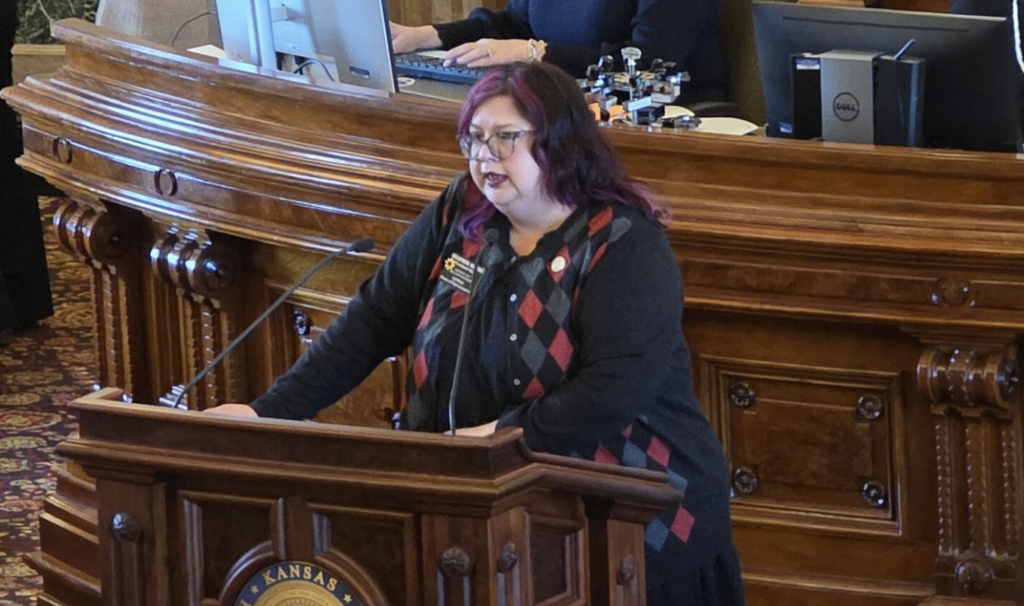Missouri legislators zero in on guns, gays and gags in another year of attempted lawmaking

Well, this is new: A Republican politician in Missouri is openly gay.
Reflect on that fact for a moment because, as with a lot of things in the Missouri Statehouse, it won’t be true for long.
His name is Zachary Wyatt. He’s a 27-year-old representative from Green Castle, in northern Missouri. When the session and his term end May 18, he’ll be jetting off to Hawaii, trading cattle farming for mai tais and sunscreen. He just had to finish one errand first.
“Being gay has never been a Republican or Democrat issue, and it should never be,” Wyatt said May 2 in prepared remarks, in which he came out — and also came out against the “Don’t Say Gay” bill that would bar discussing homosexuality in public schools. “With national attention on the Missouri House of Representatives in regards to House Bill 2051, I am compelled to still speak out against colleagues and especially the special interest groups who have pushed this bill forward.”
Welcome to the bumpy close to another chaotic Statehouse session in Missouri’s now-you-see-it, now-you-don’t Legislature.
This year, the Missouri Legislature has been great fodder for late-night comedians such as Stephen Colbert, who riffed on the “Don’t Say Gay” bill on his Comedy Central show, The Colbert Report.
“Folks, finding out that homosexuality exists is a slippery slope to tolerating it,” Colbert said.
The Daily Show‘s Aasif Mandvi followed up that report, butting heads with state Rep. Wanda Brown over House Bill 1621, which prevents employers from firing employees for owning guns — instances of which no one had heard before Brown’s bill.
“How many examples of gun-owner discrimination do you know of?” Mandvi asked Brown.
“Well, you know, I’d rather not get into examples,” she stumbled.
“Right, you must have thousands of them. But can you give me a few?”
“This is preventative,” she said. “I’d just like to protect the Second Amendment [rights] of everyone in the future.”
An awkward roasting ensued.
There’s a certain brand of national reporting that exists solely as political rubbernecking for eye-grabbing conservative legislation. State Sen. Brian Nieves caught The Atlantic‘s attention with SJR 45, a secession-lite bill that “prohibits the Missouri legislative, executive, and judicial branches of government from recognizing, enforcing, or acting in furtherance of any federal action that exceeds the powers delegated to the federal government.”
“Whoa,” wrote The Atlantic‘s Andrew Cohen. “Is Missouri going to declare war on the United States? Are its citizens going to refuse to enforce laws they don’t agree with?”
Cohen followed up with a distraught update on HB 1534, sponsored by state Rep. Kurt Bahr, which criminalizes the implementation of Obamacare, punishing any federal official who attempts to enforce the Affordable Care Act with up to a year in prison.
“What in the world is happening in Missouri?” Cohen asked. “Don’t state lawmakers there have more important things to do with their time, and more practical causes to advance on behalf of their many constituents, than ginning up one unconstitutional piece of legislation after another? Is the political process in Jefferson City so hijacked by radicals that it cannot help itself?”
Most of the Missouri Legislature’s more extreme ideas never become law, primarily due to a more temperate Missouri Senate killing the House’s grandest aspirations, like a black hole shredding the stars that careen its way.
Consider the autopsy of House Bill 1860 — may it rest in peace, for now — which pitted Missouri hog farmers in a battle against the First Amendment.
On April 19, by a veto-proof majority of 108-32, the Missouri House of Representatives voted to pass HB 1860, which would have made it a misdemeanor to lie on a job application to an animal farm — and to film or merely possess undercover footage.
[page]
“Agriculture is the state’s largest industry and needs to be protected from anti-agriculture organizations and individuals,” reads a summary of industry testimony given as the bill cruised through the Missouri House Committee on Agri-Business, which is chaired by seventh-generation farmer and northern Missouri Rep. Casey Guernsey, who also sponsored the bill.
Like Brown and her bill against gun-owner discrimination, Guernsey couldn’t cite any instances of undercover activists filming Missouri farms. He got the idea for the bill after a local radio station ran a story on an “eager-beaver activist” who sneaked into an Iowa processing plant to take footage in order to create slanted “propaganda,” he told The Pitch.
Such stunts — and their startling, brutal videos — have resulted in a lot of bad PR and lost business for animal farmers nationwide, as well as a few charges of animal abuse. Missouri’s bill was just the latest version of an industry-backed clampdown that spans several states.
“Farmers and ag businesses really don’t have anything to hide,” Guernsey said, citing government inspectors who are on-site “all the time.”
“The problem is what they [activists] capture and how they use what they capture. It’s all in propaganda. You’re gonna use the most sensational-appearing images when you run a campaign, which is absolutely what these folks are doing. … The folks who try to gain access to these facilities just don’t have an open mind.”
Guernsey added that such footage “can get blown out of proportion pretty quickly.” He explained that the bill was intended to target animal-rights groups, like the Humane Society of the United States, which he said targets farmers. (Of course, the Humane Society protested Guernsey’s bill. “Lawmakers should be encouraging laws that protect animals from abuse, not protecting factory farms from scrutiny,” HSUS spokesman Matthew Dominguez told The Pitch.)
But the bill’s implications cut much deeper than just farmers versus activists.
The “ag gag” legislation, as activists call it, was a close copy of a bill originally proposed in Iowa. The Iowa bill, in turn, mirrored the “Animal & Ecological Terrorism Act” draft legislation proposed by the American Legislative Exchange Council (ALEC) in 2003, as part of a report that compared radical animal-rights groups with al-Qaida. (ALEC, a national business-backed conservative legislative group, received heavy criticism for backing “Stand Your Ground” laws after 17-year-old Trayvon Martin was shot and killed by George Zimmerman in Florida.) The ALEC ecoterrorism bill also made undercover filming illegal.
In their companion bills, Iowa and Missouri legislators went further than ALEC, criminalizing the mere possession of undercover footage. (For example, the proposed law would appear to make it a misdemeanor for a news outlet like The Pitch to “possess and distribute” undercover footage of animal abuse, even if it hadn’t filmed it.)
“At the very least, I think there are serious questions about even the first part of this bill, which makes it a crime to take these videos,” said Doug Bonney, legal director of the American Civil Liberties Union of Kansas & Western Missouri, after the bill passed the House.
Bonney called the provision criminalizing publication of such footage “clearly unconstitutional” and “pretty shocking.”
The U.S. Supreme Court has long protected the right of journalists to publish newsworthy information, even if it has been illegally obtained by someone else, which is how The New York Times came to publish WikiLeaks documents without half of the newsroom going to jail.
Iowa legislators dropped the provision criminalizing publication after the state’s attorney general questioned its constitutionality. Missouri House legislators did not.
[page]
Jean Maneke, an attorney for the Missouri Press Association, said the association has fought similar legislation for about four years. Maneke said the language in the bill might unintentionally criminalize journalists taking photos of farms from a plane in a public airspace or from a public highway.
“I’m not sure those who are pushing this have stopped to think about how this impacts journalists who are trying to do their jobs,” she said.
Guernsey, the bill’s sponsor, fumbled a bit when The Pitch asked how the bill could criminalize the publication of footage, in spite of the First Amendment.
“I guess, by de facto, if it’s illegal to take it,” he said, then paused and stopped himself. “Uh, no, that’s not really a concern of mine — that’s not the intent of the bill, to criminalize possession of an illegally produced videotape. But it would be illegal to produce it. I don’t see the word ‘possession’ in that bill anywhere.”
Except it was: “A person commits the crime of agricultural production facility interference if such person acts without the consent of the owner of an agricultural production facility, as defined in section 578.660, to willfully … (2) Possess or distribute a record which reproduces an image or sound occurring at the facility which was produced as provided in subdivision (1) of this subsection [which makes undercover recording illegal].”
When the bill’s language was read back to him, Guernsey backed up a bit and repeated that his intention wasn’t to criminalize journalism, which he acknowledged has broad First Amendment protections.
“If only farmers had as much protection as journalists,” he said.
Guernsey said two outside legal groups, which he wouldn’t name, helped write the bill.
But the Missouri Press Association’s Maneke was not impressed with the legislation’s craftwork.
“I think this bill is not well-written and well-thought-out at all,” Maneke said. She added, with a jab at Missouri’s controversial term-limits law, “This is an indication of some of the problems you have when you see new faces in the Legislature.”
A few days after Guernsey spoke to The Pitch, his bill — which had easily passed the House — disintegrated in the Senate’s agriculture committee.
“Some of the senators on the committee raised concerns that the Missouri Press Association had raised,” said Pat Thomas, chief of staff for Brian Munzlinger, ag committee chairman.
A proposed replacement bill cut almost everything except a watered-down provision that would compel farm employees to submit animal-abuse videos to law enforcement within 24 hours of filming — a far cry from Guernsey’s criminal ban on publication. Thomas cited a “First Amendment problem” as the reason for the change, and when asked about the gap between the House’s overwhelming vote and the Senate committee’s complete demolition, she said, “The Senate is a more deliberative body.”
As of press time, the future of the Senate’s replacement bill was uncertain. However, Guernsey appears willing to die on this hill. In an e-mail to The Pitch, Guernsey wrote that he’s trying to put his language back in — in this bill or a future one.
“I will be ammending [sic] all Senate Ag bills with my language,” he wrote. “I do believe there is a good chance they will restore the language to the original bill. Most of it was stripped because of faulty information. It would have been a good idea if the powers that be had called me first and it would have been cleared up. oh well!”
HB 1860 is dead; long live HB 1860 — or at least until Guernsey hits his term limit. The clock is ticking. It expires in 2016.




